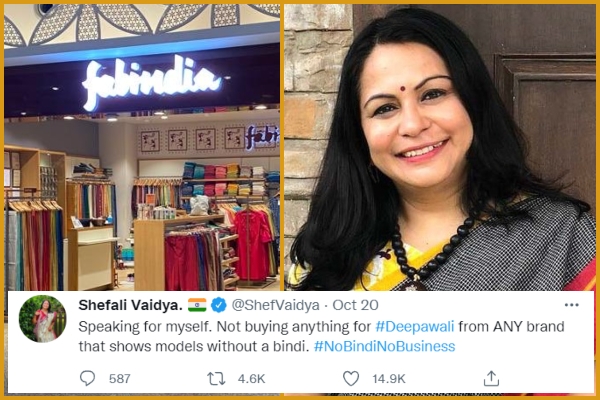#NoBindiNoBusiness- How a significant social media trend can shake the commerce industry; FabIndia stores go empty ahead of Diwali
22 Oct 2021 16:03:42
A single tweet, a single significant social media trend can shake the entire commerce industry. Don't you believe this? Well, #NoBindiNoBusiness trend that forced clothing brand FabIndia to grab headlines by forcing it to change the Urdu name of its Diwali collection 'Jashn-e-Riwaz' to 'Jhilmil Si Diwali', is on its mission to target all those business's who promote their products wrapped up on models who wear #NoBindi.
"Speaking for myself. Not buying anything for #Deepawali from ANY brand that shows models without a bindi. #NoBindiNoBusiness", author Shefali Vaidya had tweeted a couple of days ago first opposing the sad #NoBindi faces and the heavy Urdu terminology used by the American clothing brand Fab India. In a deliberate attempt of abrahamising the Hindu festival of Diwali, the Fab India group in its Diwali advertisement campaign had launched the ‘Jashn-e-Riwaaz’ collection. The cultural appropriation somehow left social media users uncomfortable where not many favored Diwali being loosely translated to ‘Jashn-e-Riwaaz’. The lady models in the poster were seen wearing red colored clothes but no bindi.

While Shefali Vaidya's voice went viral on Twitter within no time, several users shared photos of themselves wearing bindis or tilaks. A lot of Twitter users also spoke about how a bindi was part of their identity, others argued that wearing a bindi or not should be a personal choice. "Bindi has nothing to do with an individual’s personal choice. It is about brands de-Hinduising Deepawali with models looking like Rudaalis at a Janaza. If brands want Hindu money, they should respect Hindu sentiments", she said in response to it loud and clear. The tweet got more than a lakh of impressions and thousands of Hindus raised their voice unitedly against the brands those who fail to showcase bindi as Bharat's pride.
In a series to expose more such blatant brands, Shefali Vaidya yet again today took a jibe at PNG jewellers for featuring Marathi Cinema Actress Sonali Kulkarni without Bindi. She also praised brands like Jagannath Gangaram Pednekar, Vaman Hari Pethe jewellers for showcasing the real Hindu culture and portraying the real meaning of Diwali. "#This is what #Deepawali collection should be like!", she tweeted sharing advertisement featured by Pednekar Jewellers.
Meanwhile, the brand-FabIndia that triggered the whole debate was seen empty, the image of which was shared by Shefali Vaidya. The clothing brand that has more than 327 outlets and Rs 1500 cr sale mark all over the Bharat should have thought twice before playing with the Hindu sentiments. 'Jashn-e-Khali', she captioned the image.
Aside from the beautiful saris and gold jewelry that characterize much of the Indian subcontinent’s culture, one of the most internationally-known body adornments worn by Hindu women is the bindi, a red dot applied between the eyebrows on the forehead. Hindu tradition holds that all people have a third inner eye. The two physical eyes are used for seeing the external world, while the third focuses inward toward God. As such, the red dot signifies piety as well as serving as a constant reminder to keep God at the center of one’s thoughts.
ALSO READ- Fab India withdraws its 'Jashn-e-Riwaz' Diwali ad; Renames it as 'Fab India Festive 2021'
Bindi as believed by Hindus is more than just a red dot. If the brands stated do not know the symbolism behind the dot or don’t care to learn about it, then there’s no reason for them to wear it. But in that case, they must accept the fact that the Hindu festival of Diwali which is a symbol of prosperity will no more be properous for them. People must respect the Hindu sentiments or forget the Hindu customers- Clear.
.
.